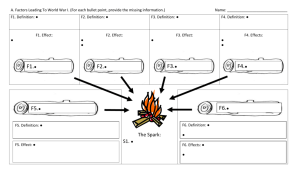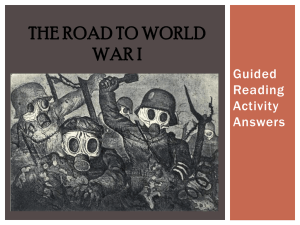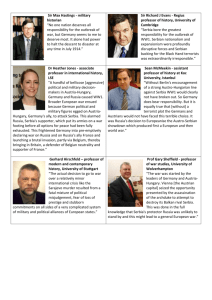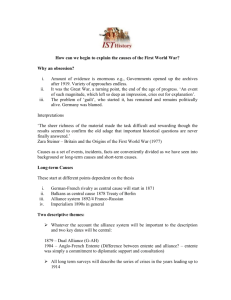Dwyer WW1 Revision Note
advertisement
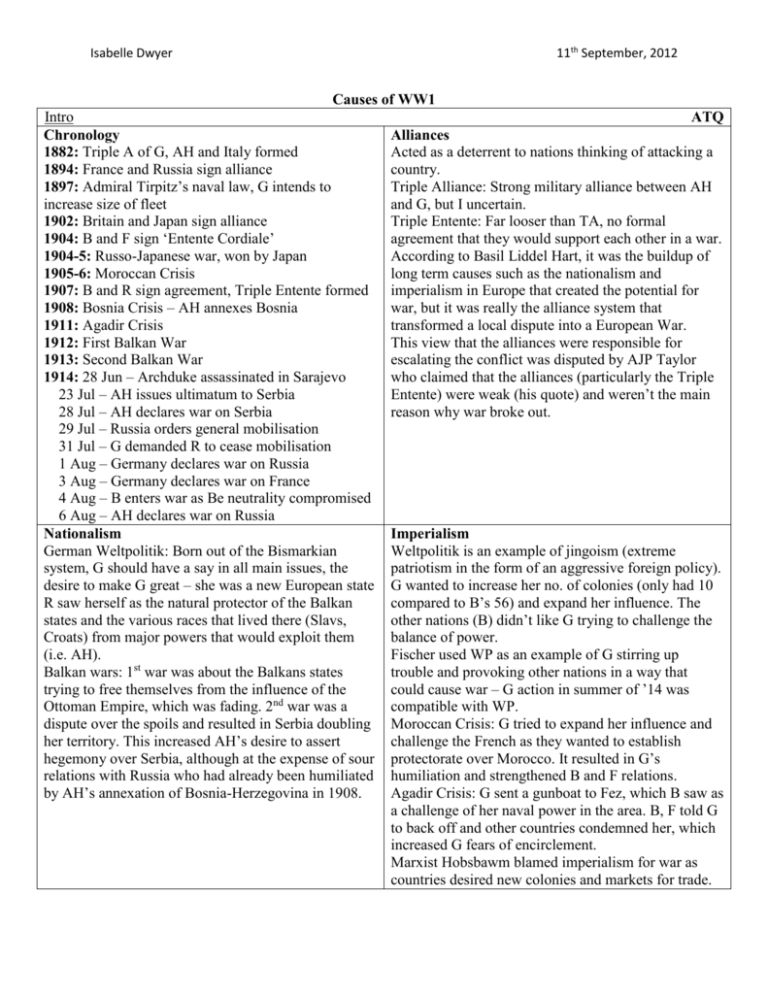
11th September, 2012 Isabelle Dwyer Causes of WW1 Intro Chronology 1882: Triple A of G, AH and Italy formed 1894: France and Russia sign alliance 1897: Admiral Tirpitz’s naval law, G intends to increase size of fleet 1902: Britain and Japan sign alliance 1904: B and F sign ‘Entente Cordiale’ 1904-5: Russo-Japanese war, won by Japan 1905-6: Moroccan Crisis 1907: B and R sign agreement, Triple Entente formed 1908: Bosnia Crisis – AH annexes Bosnia 1911: Agadir Crisis 1912: First Balkan War 1913: Second Balkan War 1914: 28 Jun – Archduke assassinated in Sarajevo 23 Jul – AH issues ultimatum to Serbia 28 Jul – AH declares war on Serbia 29 Jul – Russia orders general mobilisation 31 Jul – G demanded R to cease mobilisation 1 Aug – Germany declares war on Russia 3 Aug – Germany declares war on France 4 Aug – B enters war as Be neutrality compromised 6 Aug – AH declares war on Russia Nationalism German Weltpolitik: Born out of the Bismarkian system, G should have a say in all main issues, the desire to make G great – she was a new European state R saw herself as the natural protector of the Balkan states and the various races that lived there (Slavs, Croats) from major powers that would exploit them (i.e. AH). Balkan wars: 1st war was about the Balkans states trying to free themselves from the influence of the Ottoman Empire, which was fading. 2nd war was a dispute over the spoils and resulted in Serbia doubling her territory. This increased AH’s desire to assert hegemony over Serbia, although at the expense of sour relations with Russia who had already been humiliated by AH’s annexation of Bosnia-Herzegovina in 1908. ATQ Alliances Acted as a deterrent to nations thinking of attacking a country. Triple Alliance: Strong military alliance between AH and G, but I uncertain. Triple Entente: Far looser than TA, no formal agreement that they would support each other in a war. According to Basil Liddel Hart, it was the buildup of long term causes such as the nationalism and imperialism in Europe that created the potential for war, but it was really the alliance system that transformed a local dispute into a European War. This view that the alliances were responsible for escalating the conflict was disputed by AJP Taylor who claimed that the alliances (particularly the Triple Entente) were weak (his quote) and weren’t the main reason why war broke out. Imperialism Weltpolitik is an example of jingoism (extreme patriotism in the form of an aggressive foreign policy). G wanted to increase her no. of colonies (only had 10 compared to B’s 56) and expand her influence. The other nations (B) didn’t like G trying to challenge the balance of power. Fischer used WP as an example of G stirring up trouble and provoking other nations in a way that could cause war – G action in summer of ’14 was compatible with WP. Moroccan Crisis: G tried to expand her influence and challenge the French as they wanted to establish protectorate over Morocco. It resulted in G’s humiliation and strengthened B and F relations. Agadir Crisis: G sent a gunboat to Fez, which B saw as a challenge of her naval power in the area. B, F told G to back off and other countries condemned her, which increased G fears of encirclement. Marxist Hobsbawm blamed imperialism for war as countries desired new colonies and markets for trade. Isabelle Dwyer Militarism Steel Production ‘13 (mil tons): B-7.7, G-17.6 Armies (mil): B-0.7, F-3.7, G-4.2 Navies (no of ships): B-358, F-207, G-281 G land: Schlieffen plan to avoid a war on two fronts by invading F through Be. It required fast mobilisation and that Russia took 12 weeks to mobilise their troops. F land: Plan 17 was to mobilise all their troops through Alsace-Lorraine and then run to take Berlin. It also required swift action. B land: BEF had 125,000 soldiers, but no real plan. G sea: Admiral Tirpitz’s Risk Theory was idea that G navy could control the North Sea by having enough ships to scare the B navy into inaction. B sea: Two Power Standard - for every ship G and F built, B would build 2, so their navy would be twice the combined strength of F and G. Naval Race: Btw G and B to build up dreadnoughts, in the end although B had more ships (27-19), G achieved her aim of forcing B navy into inaction. Historiography Sydney Fay: Complex assortment of factors that caused the outbreak of WW1, no one country was to blame above the others - ‘collective responsibility’. Niall Ferguson: Placed most of the blame on Britain, he claimed that the B political and military leaders planned to interfere with European conflict. Franz Fischer: Return to idea that G held majority of responsibility because she went out of her way to push for a war (shown through Weltpolitik) in order to make G a dominant power in Europe and also to deal with the domestic tensions created by rise of left. John Stoessinger: He blamed the personal failings of those managing the July Crisis. Conc 11th September, 2012 July Days It was not the assassination of Archduke Franz Ferdinand (28 Jun) that resulted in WW1 but the month that followed and the political/military decisions made during the July Days. AH used Serbia’s refusal of ultimatum and B used G invasion of neutral Belgium as an excuse for war. When AH declared war on Serbia (28 Jul), Russia mobilised the next day, determined not to let Serbia down again. German mobilisation started the war in motion as the Schlieffen plan was carried out. When the Kaiser and Tsar gave the orders for mobilisation, authority transferred to the military generals. They wanted a war because there hadn’t been a major European war for 50 years. Tragedy of Miscalculation LCF Turner’s view was a continuation of Stoessinger’s. Three main mistakes made: R tsar and G Kaiser’s failure to realise that the order for mobilisation was a declaration of war. G mistake in sending AH ‘blank cheque’ and giving AH unconditional support believing that it would frighten Russia into inaction. AH not believing that Russia would go to war to defend Serbia, as she did before during the 1908 Bosnia-Herzegovina crisis. B’s mistake in not being more assertive towards G and making it absolutely clear that she would go to war if Belgian neutrality was compromised. ATQ Basil Liddel Hart claimed that “50yrs were spent making Europe explosive, but it took only 5 days to detonate it” Stoessinger claimed “If different personalities had been in positions of authority in July 1914, there may never have been a war” AJP Taylor wrote “As late as 1911… the Triple Entente was in the process of disintegration” Gilbert wrote “As focus intensified upon armies, authority shifted towards war ministers” Williamson “The blank cheque gave Vienna the assurances needed to opt for decisive action against Serbia” AJP Taylor “The conflict arose from feelings of weakness rather than strength” Lenin wrote that “Imperialism is the highest form of capitalism”
